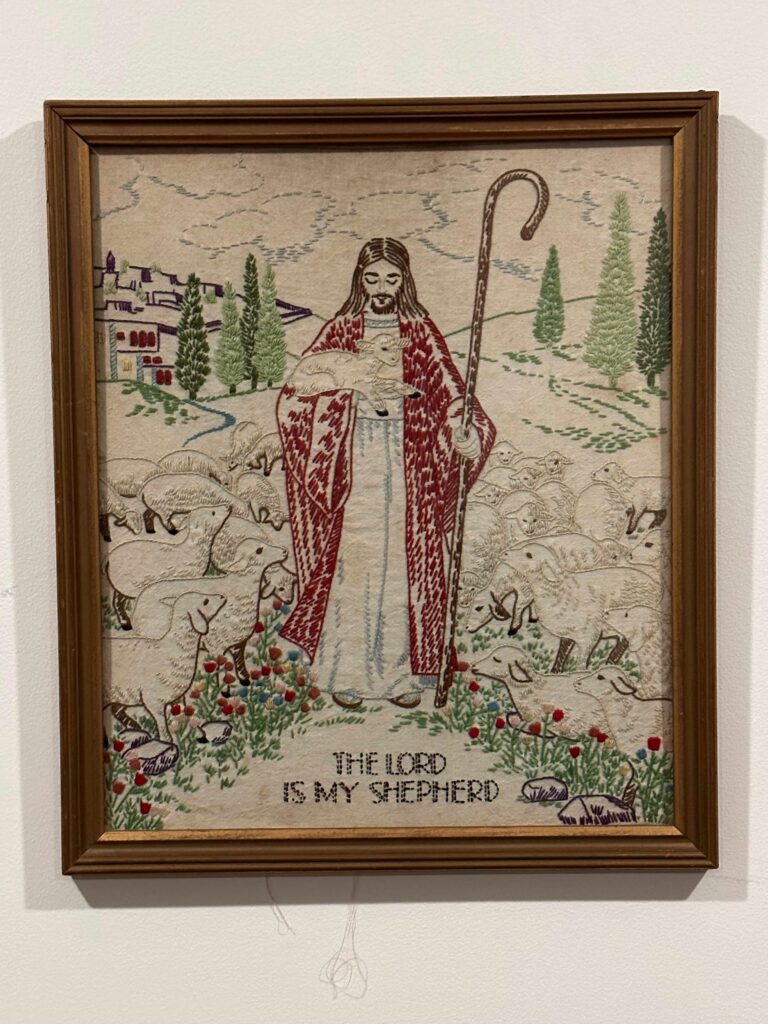Jeff Garrison
Bluemont and Mayberry Churches
March 26, 2023
1 Peter 5
At the beginning of worship:
Eric Hoffer once said: “In times of great change, learners inherit the earth, while the learned find themselves beautifully equipped for a world that no longer exists.”[1]
Certainly, the church (and our world) is in flux and change is all around us. We need leaders willing to learn and to risk and to depend on God, not those who consider themselves already learned. Peter, I believe, has something to say about such leaders in today’s text.
Before reading Scripture:
We’re at the end of Peter’s first epistle. In this section he encourages his readers to do four things. We’re
- to be humble,
- to cast our anxieties upon God,
- to be disciplined in our lives,
- and to resist evil.
And he reminds us that God has made a four-fold promise to us. God will
- restore us,
- support us,
- strengthen us,
- and establish us (within his kingdom).
Read 1 Peter 5
A few weeks ago, I received a copy of a privately published book by a friend, Dr. Jim Spindler.[2] Jim was my parish associate when I served First Presbyterian Church in Hastings, Michigan. After a career in medicine, he returned to school to prepare himself for ministry. But in truth, he’d been doing ministry for years which should remind us that you don’t have to go to seminary to minister to others.
Doing ministry before being trained
Early in his life, Jim thought he might become a missionary, but he soon had children and was involved in practicing medicine and running pharmaceutical medical trials. By the way, this included Rogaine. As my head attests, they were not always successful. But that’s another story. However, he once gave me a Rogaine t-shirt and told me, I should tell people I received the placebo.
Long before I met Jim, he started participating with mission trips with the Luke’s Society that took him to Eastern Europe and Africa. He also ran mission trips to Honduras and into the interior of the Yucatan. When I accepted the call to Hastings, I joined him on many of these mission trips and learned from him much about compassion and leadership.[3]
Leaders should lead by example
Jim is a wonderful yet humble leader. He’s slowing down, but then age catches up with all of us. He now spends much of his time taking care of his wife. In a way, he’s still leading by example. When he led trips, it wasn’t about Jim. The focus was always on the needs of people we could help. He casted a godly vision. He always worked hard, and he encouraged others. Not only was he open to advice, but he also sought it out so that he could improve the experience of the mission workers and the patients.
In thirty years of leading short-term mission trips, he took hundreds of people along with scores of physicians, including many residents, into parts of the world beyond the tourist. We not only saw poverty in a new way but were encouraged to meet and engage with the people as valuable children of God.
Peter speaking on leadership
As Peter wraps up his first epistle, he speaks to the leadership of the churches. I think Spindler meets Peter’s expectations of a Christian leader.
We often think of leaders as people who are powerful and rule with an iron fist to get things done. But that’s not a Biblical example. Jesus is the antithesis to such leadership. He shoots it down with sayings like the last will be first, and if you want to be great you must be willing to humble yourself in service.[4]
Humility needed in Christian leadership
As one author notes, “Jesus teaches that the church’s leadership should be the polar opposite from those in the world. Authority is always to be that of service.”[5]
Leading God’s flock
In Peter’s last conversation with Jesus as recorded in the gospel of John, Jesus insist that Peter take seriously the feeding of his (Jesus’) flock. Peter got the message and passes it on in this letter, reminding the leaders of the churches to whom the letter was sent to tend the flock of God.
Review of the text
Interestingly, at this last chapter of the letter, Peter changes voices and writes in the first person, as he reminds his readers that he was a witness to Jesus’ suffering and his glory. Much of this epistle, as I pointed out, is Peter reworking the Roman idea of a household code; that is, how are we to act considering our place in society. But like he’s done elsewhere, Peter turns these codes on their head. Instead of starting with those on the lower stratum of society and working up, he starts at the top, with the church’s leadership.[6]
Elders and shepherds

Peter uses the word “elder” here, from which we obtain the word “Presbyterian.” But it’s clear he’s not talking about old folks, but leaders within the church. Like Jesus had advised him, he advises the leaders among his readers to “tend God’s flock.” The idea of God’s people being sheep is nothing new. In the Old Testament, God was seen as a shepherd guiding Israel. The 23rdPsalm emphasizes this role with the opening line, “The Lord is my shepherd.” In the gospel of John, Jesus is identified as the “good shepherd.”[7] In my living room, there is a needlepoint done by my grandmother when she was a young woman depicting Jesus in this manner.
Peter takes this a step further and reminds his readers of the earthly role for shepherding leaders. But he also reminds us—pastors and elders—that the sheep we oversee are not ours. (You are not my flock.) We all belong to God and those of us who find ourselves in leadership roles are to tend God’s flock for God, not for our own benefit.
Furthermore, we are to do this without a desire to gain recognition or reward, but willingly because we have experienced God’s care in our lives. Finally, we carry out such work faithfully, knowing that we are always under the chief shepherd and in the hope that our blessings will come when the Good Shepherd returns.
Humility
Regardless of whether we’re a leader, Peter reminds us that we’re all called to a humble life. Recalling a Proverb, writes, “God opposes the proud, but gives grace to the humble.”[8] Again, Peter challenges the Roman structure here, where some were to be honored and everyone else humbled. Within the Christian fellowship, everyone is to be equally humbled because we are all dependent upon the same grace. In time, we’ll be exalted, but until then, we need to be content and trust that God is in control, which is a statement of hope for many in the early church as they were persecuted for their faith in Jesus.
Our adversary
In verse 8, Peter reminds us of our adversary, a roaring lion, is out to get us. The Message translates this verse as “the Devil is poised to pounce and would like nothing better than to catch you napping.” Evil is a reality, as Peter’s readers know. The reference to a lion on the prowl goes well with the idea of the church made up by sheep. Sheep must stay together, lest they stray and become easy prey for a lion. Likewise, shepherds must remain alert to protect the flock. Evil, as it is represented here as a lion, doesn’t threaten God’s sovereign rule.
Bringing up the image of a lion encourages his reader to do what’s right. Peter reminds us that God is in control and can be trusted. We just need to stay with the flock. The devil out prowling reminds us of the dangers when we insist on doing things our own way and without Christ.
A second reason Peter may place the blame on the Devil at this point is to take the blame off those who are carrying out the persecutions. After all, Peter’s readers could name their adversaries who have persecuted the Christians who lived on the margins of society and with little control.[9] Peter doesn’t want people to seek revenge or to look upon their persecutors with disdain. Instead, the evil one uses these persecutors to carry out his devious deeds. Their complaints aren’t with the individuals who committed such acts, but with a system that that encourages such behavior.[10]
We all face danger and persecution
Peter concludes his remarks with a reminder that Christians all over the world are in danger, but that the suffering won’t be forever. “God will bestow glory upon us,” he promises. It may not sound good to know that you’re suffering with everyone else—that sounds more like misery loves company—but the hope here is that there is a new world coming. Hang on, hold fast to your beliefs, and trust the Lord.
Conclusion
Peter provides an “eschatological perspective” to suffering. In other words, he points to God’s grace to encourage us to trust in God, even when things are not looking up.[11] In this closing chapter of the epistle, he writes to the leaders, but also to those who are younger (or maturing Christians) who may become leaders. During tough times, we need the church, and the church needs those who can lead and needs to be preparing others who can take their place. We all need to be growing in our faith. What are you doing to help yourself grow as a disciple and as a valuable member of our fellowship.
Centered and Soaring
Last fall, some 15 people from Mayberry and Bluemont Churches attended a program titled, “Centered and Soaring.” Since then, many of us have been a part of micro-groups that have met for study, sharing and prayer.
There is another opportunity to learn more about being centered in Christ and soaring within the church on Saturday, April 29. Those who attended the program in the fall should come back to be strengthened in their faith Those who didn’t attend can still come along and learn more about how we can share our faith and do God’s work in the world. I hope you pray about this opportunity and pencil the date in on your calendar, so you’ll have no excuse!
In all we do, to God be the glory. Amen.
[1] Tod Bolsinger used this quote in a talk given at the Calvary Partner Network. See https://www.youtube.com/watch?v=cTCB4RC2LFM
[2] James R. Spindler, MD, Blessed to Be a Blessing (privately published, 2023).
[3] I recently wrote posted in my blog an article I’d written in 2007 about one such trip to Honduras. Click here to read this post: https://fromarockyhillside.com/2023/02/02/a-return-visit-to-honduras/
[4] Matthew 18:1-4, Mark 10:42-45, and Luke 22:22-30.
[5] Christopher A. Hutchinson, Rediscovering Humility: Why the Way Up is Down (Greensboro, NC: New Growth Press, 2018), 146.
[6] Joel B. Green, 1 Peter (Grand Rapids, MI: Eerdmans, 2007), 164.
[7] John 10:1-18.
[8] Proverbs 3:34. Peter actually quotes from the Greek Old Testament here, and not from the Hebrew text which is slightly different but with the same meaning. See J. N. D. Kelly, Commentary on the Epistle of Peter and of Jude, (Peabody, MA: Hendrickson, 1969), 194.
[9] Green, 180.
[10] It has often been pointed out that an unjust system will be problematic for both those in power and those who are denied power. Those denied power feel shame and hate toward the powerful, while those who are in power feel threatened and therefore hate toward those who are denied power. Martin Luther King used this kind of logic and is why he encouraged his followers to love and not hate those in power. See Brian D. McLaren, Everything Must Change: Jesus, Global Crises, and a Revolution of Hope (Nashville: Thomas Nelson, 2007), 237-242.
[11] Peter H. Davids, The First Epistle of Peter (Grand Rapids: Eerdmans, 1990), 200.















